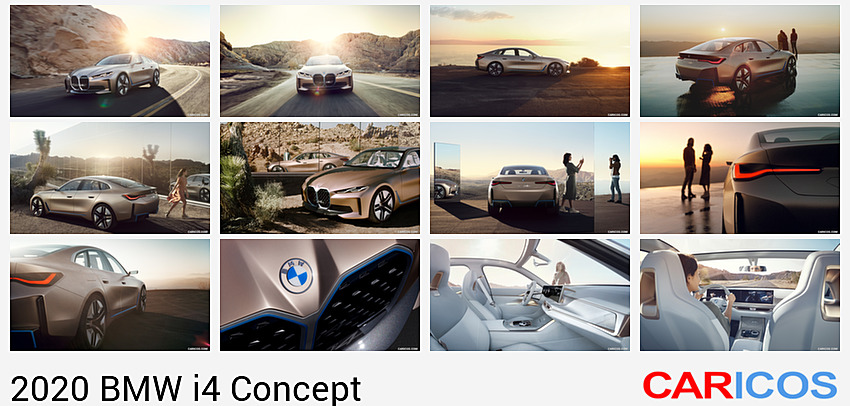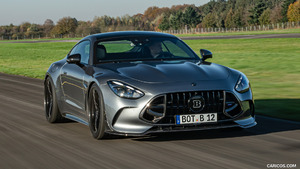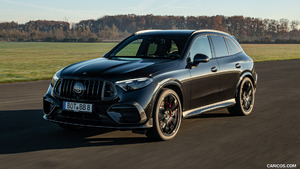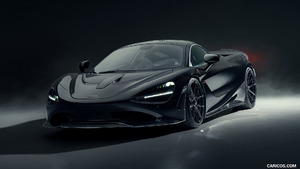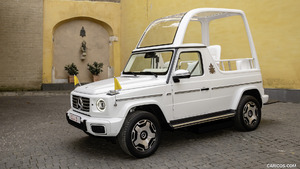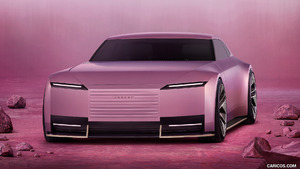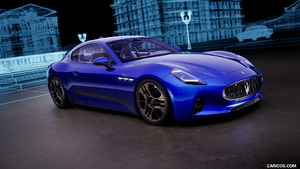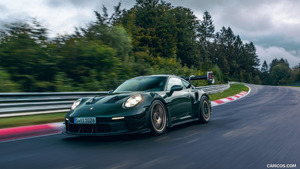BMW i4 Concept
The BMW Group is opening a new chapter in its history with the unveiling of a pure-electric Gran Coupe. The BMW Concept i4 takes electric drive to the core of the BMW brand and heralds a new era in Sheer Driving Pleasure. The BMW Concept i4 represents a look ahead to the BMW i4, slated to enter production in 2021. It provides a whole new take on the dynamic excellence for which BMW is renowned and blends a modern, elegantly sporty design with the spaciousness and functionality of a four-door Gran Coupe – all while generating zero local emissions.
“The BMW Concept i4 brings electrification to the core of the BMW brand,” says Adrian van Hooydonk, Senior Vice President BMW Group Design. “The design is dynamic, clean and elegant. In short: a perfect BMW that happens to be zero emission.” The drivetrain’s standout numbers include a range of up to 600 km (WLTP), output of up to 530 hp, 0 – 100 km/h (0 – 60 mph) acceleration of approximately 4.0 seconds and a top speed in excess of 200 km/h (124 mph). However, the driving qualities of the BMW Concept i4 cannot be expressed in figures alone. The virtually silent delivery of power creates an entirely new sensation of dynamism.
“The design of the BMW Concept i4 shows fantastic proportions, a powerfully expressive character and, of course, a lot of attention to detail,” adds Domagoj Dukec, Head of BMW Design. “With the BMW Curved Display, we have redefined BMW’s signature driver focus in an extremely elegant way. At the same time, the BMW Concept i4 transports a feeling of sustainable driving pleasure.” As part of the package, the Concept i4 includes several exterior and interior design elements which will make an appearance in both the BMW i4 and other electrically-powered production vehicles.
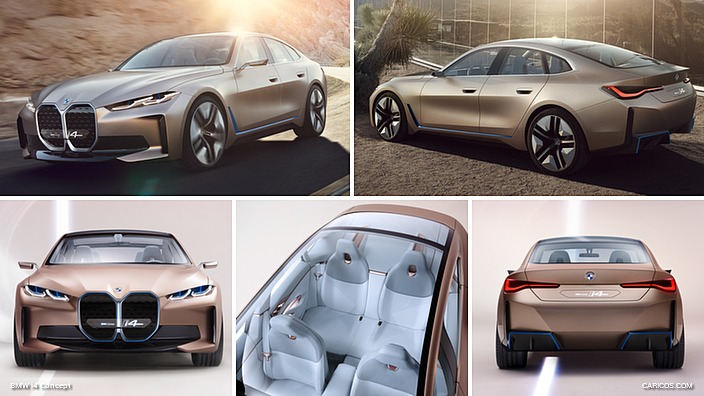 2020 BMW i4 Concept
2020 BMW i4 Concept
The exterior – electrifying aesthetics.
The modern, elegant exterior represents a deliberate counterpoint to the dynamic flair of the driving experience. The perfectly resolved Gran Coupe proportions create an authentic, modern and confident appearance. The long wheelbase, fastback roofline and short overhangs form a basic profile brimming with elegance and dynamism. With its four doors, the BMW Concept i4 offers not only a high level of everyday usability and practicality, but also a much larger interior than the car’s modern and dynamic proportions would immediately suggest.
Clear surfaces and aerodynamic details.
Crisp, smooth lines and taut volumes merge into a rich, smoothly contoured sculpture and create a clear surfacing language. The modern exterior paint shade Frozen Light Copper reprises a colour nuance displayed by the BMW Vision iNEXT and showcases the interplay of surfaces to visually stunning effect. Blue elements in the front end, flanks and rear end point to the car’s BMW i origins. They shine a spotlight on the signature BMW i icons and bring the technology below the surface to the fore – for example, the kidneys in their role as an intelligence panel, the mouldings in the side skirts concealing the battery technology, and the diffuser elements in the rear end, which fill the design space vacated by exhaust tailpipes and enhance aerodynamic efficiency.
A host of other aerodynamic measures maximise the car’s electric range. The blanked off kidney grille and clear aero lips provide detail examples of sophisticated airflow engineering at work. Another distinctive area of the car are the wheel rims. These have been designed exclusively for the BMW Concept i4 and blend aerodynamic and lightweight design; smooth – and therefore aerodynamically optimised – surfaces contrast with ultra-low-weight, high-strength spokes. The rims extend the car’s palette of colours and materials, emphasising its luxurious overall character.
The front end – the eye-catching face of a new era.
The front-end treatment of the BMW Concept i4 presents the familiar BMW icons in a new look, lending a visually powerful face to the electric age at BMW. The prominent, closed-off kidney grille provides a tangible connection between the past and future of BMW. The BMW icon also gains new functionality: With no combustion engine to require cooling, the grille now serves primarily as an “intelligence panel” housing various sensors. The grille teases the technology behind the scenes with a special design for this model. The headlights likewise provide a bridge between the past and the future; the classical four-eyed front end is reprised here with a very modern and pared-back interpretation. Two intricate, freestanding LED elements on either side integrate all of the requisite light functions. Clean surfaces and a small number of crisp lines around the grille create a contemporary front-end graphic with considerable visual impact. A BMW i-style blue accent in the grille surround sets the seal on the front-end styling.
Taking the first steps with the new BMW brand identity.
In the course of the BMW Concept i4 presentation BMW is unveiling the brand’s new look for the first time. The new logo for communications also provides the basis for the badge on the BMW Concept i4. Its two-dimensional and transparent design ensures seamless integration and brings the special exterior colour shade Frozen Light Copper to even greater prominence. The concept car not only has the task of looking ahead to the future in terms of aesthetics, technology and innovation, it also explores the design potential within our BMW trademark.
Striking rear end with aerodynamic features.
The rear of the BMW Concept i4 sits low over the road and cuts a broad, horizontally emphasised figure. The surfaces progress across the rear in a smooth and luxuriant movement, and give it a very modern and calm appearance. The long, slim L-shaped rear lights continue the theme. Below the rear lights, the inward-angled surfaces form aerodynamics-enhancing lips and incorporate vertical air outlets. The verticality of the design here emphasises the car’s sporting stance. Further down, the rear apron has a forceful presence and enhances aerodynamic efficiency. Where exhaust tailpipes would once have been found, diffuser elements in BMW i Blue indicate the presence of a pure-electric drive system and reference the design of the BMW i Vision Dynamics.
The interior – innovation meets minimalism.
The interior of the BMW Concept i4 focuses on those times when the driver chooses to pilot the car themselves. To this end, every element in the front of the cabin is trained on the driver. The new BMW Curved Display teams up with the steering wheel to reveal a new take on driver orientation and offers a look ahead to the display in the production versions of the BMW iNEXT and BMW i4. Here, the presentation surfaces of the information display and Control Display merge into a single unit inclined towards the driver. This screen grouping optimises presentation of information and makes the display’s touch operation more intuitive. Advanced display tech with non-reflective glass also removes the need for a shroud to shade the displays and therefore contributes to an extremely uncluttered and airy cockpit.
The BMW Curved Display encompasses a large proportion of the section in front of the driver and above the centre stack, and gives the front area a very modern appearance. Its slim, borderless form exudes quality and sophistication. Almost all operating functions are integrated into the display as part of an overall approach centred on reducing the number of haptic controls to the minimum. Even the climate control system now works by touch control.
Focus on the essential.
The front section of the interior around the BMW Curved Display also majors on pared-back design. The understated use of different materials and the fundamental arrangement of controls creates a modern yet also luxurious ambience. With this in mind, elements such as air outlets are integrated almost invisibly into the overall geometry and concealed behind strong patterns.
Accent strips in warm Gold Bronze blending to chrome lend the interior a high-class touch. The central control panel replaces a traditional gear lever with a toggle-type shifter. Elements such as the iDrive Controller and seat memory buttons in the doors are finished in a classy crystal glass. The cloth/leather combination for the seats – composed of microfibre with line graphics and natural leather tanned using olive leaf – sets a high-quality and sustainable seal on the interior. The overall result is a clearly structured, bright and airy cabin which brings across the tranquillity and authority of electric drive systems.
Spacious rear compartment.
Rear-seat passengers are greeted by a generously-sized compartment offering levels of headroom and legroom that exceed expectations of a coupe. Integral head restraints for the front and rear seats add further to the sporting feel. The cut-out in the head restraints is a classy detail that references sporty BMW models from the current line-up.
The rear seats extend the horizontal graphic emerging from the doors to create a lounge feel in the rear. Meanwhile, the outer seats reprise the dynamic form of the front seats, heightening the sporting flavour. They also use very little stitching, which further emphasises the clean and modern feel.
Further developed user interface design with Experience Modes.
The screen grouping with new BMW Curved Display provides a digital gateway into the electric age at BMW. Look and feel are clearly influenced by the latest electronic devices and have been made deliberately less “automotive” in nature. In the display itself, flat layers provide considerable visual depth. Overall, the BMW Curved Display and new presentation approach combine to provide a first-class content-viewing experience.
Three different Experience Modes enable users to explore the various facets of the electric drive system and provide a look ahead – in terms of visuals at least – to the next-generation operating system from 2021. The sometimes emphasised visual differentiation between the three Experience Modes (“Core”, “Sport” and “Efficient”) spans everything from how the user experiences the display and graphics to how the interior is presented. Ambient lighting in the dashboard, doors and (indirectly) below the display indicate the technical adjustments taking place.
“Core” mode introduces the driver’s area to an updated interpretation of the four “widgets” familiar from the display concept of existing models. Here, the graphics reprise the pattern above the air vents and the Gold Bronze accent colour, consciously referencing the car’s interior design. In the area where the central display used to be positioned, a map and widgets now line up alongside one another. The user can navigate around the diagonal widgets using a swipe movement and arrange them intuitively by drag-and-drop. This allows them to adapt the display to their personal preferences.
In “Sport” mode, the “widgets” come closer together and create a focussed view. Sideways movements behind the zones are used to show how tight the next corner is, facilitating anticipatory driving. This form of content presentation also allows effective peripheral viewing. The right-hand area of the display shows specific functions in a similar way to BMW M’s lap timer app.
“Efficient” mode debuts an “Assisted Driving View”, which shows the driver what the car’s sensors are detecting. This Experience Mode opens up deeper insights into the car’s technology, such as how it communicates with its surroundings. In the BMW Concept i4, the focus here is on anticipatory and efficient driving, and key information for efficient driving is incorporated. The right-hand area of the display shows additional vehicle information, such as the charge level and range.
The sound of the BMW Concept i4.
The BMW Concept i4 is not only characterised by its individual design, but also by its own visionary and unique sound. It was developed under the brand name of BMW IconicSounds Electric by world renowned composer Hans Zimmer together with BMW Sound Designer Renzo Vitale. BMW IconicSounds Electric aims to emotionalise BMW's electric vehicles and make them audible using individual sound worlds. The sound of the BMW Concept i4 achieves this to perfection – it combines BMW’s past and future. It gives the driver the feeling that there are no limits of expression. The sound is manifold, surprising and it provides a sense of lightness and transparency. The sound worlds of the BMW Concept i4 range from the driving sounds in "Core" mode to the more intense and pronounced sounds of "Sport" mode. Also included are the sounds of the door opening and the starting scenario.
The technology as earmarked for the upcoming BMW i4.
Fifth-generation BMW eDrive technology is a defining feature of the BMW i4 and therefore also of future electric mobility. The BMW iX3 due to go into production in 2020 will lead the way in the application of the new tech, which will be introduced in a number of electrically powered BMW vehicles – such as the BMW iNEXT and BMW i4. The electric motor, power electronics, charging unit and high-voltage battery using fifth-generation BMW eDrive technology are all-new developments enabling the BMW Group to take another significant step forward in the field of electrified drive systems. The electric motor developed for the BMW i4 generates maximum output of up to 390 kW/530 hp, which ranks it alongside a current BMW V8 combustion engine. Its instantaneous power delivery gives the BMW i4 standout performance attributes and exceptional efficiency.
The fifth generation of BMW eDrive also brings a newly designed high-voltage battery with the very latest battery cell technology. The version of the battery developed for the BMW i4 impresses with its extremely slim construction and optimised energy density. It weighs roughly 550 kilograms, has an energy content of around 80 kWh and achieves an operating range of up to 600 km in the WLTP cycle.
All in all, fifth-generation BMW eDrive technology sets new standards in terms of power density, efficiency and range in locally emission-free driving.
Series production of the new BMW i4.
Series production of the new BMW i4 will begin in 2021 at the BMW Group’s main plant in Munich. This means that, in the future, combustion-engined vehicles, plug-in hybrids and all-electric vehicles will be manufactured on the same assembly line in Munich.
Integrating the BMW i4 into the existing production system represents a challenging task for Plant Munich. The body concept of the BMW i4 differs from the architectures of the vehicle models produced at the plant to date due to the need to accommodate its high-voltage battery. Approximately 90 per cent of the existing production equipment in the body shop can be incorporated into the process, i.e. adapted to manufacture of the i4. However, the remaining ten per cent – especially the machinery involved in building the rear structure – will need to be newly built.
A separate new piece of equipment will be fitted in the assembly halls for installation of the high-voltage battery, as the battery needs to be fitted in the car from below. A particular challenge in the conversion/installation process are the crowded structures of the assembly halls. Working within these tight confines, old machinery will have to be removed and new equipment installed and brought on stream within a six-week period. This requires long-term planning and precise implementation.
The company is investing a total of around 200 million euros in Plant Munich to bring series production of the BMW i4 to fruition.

